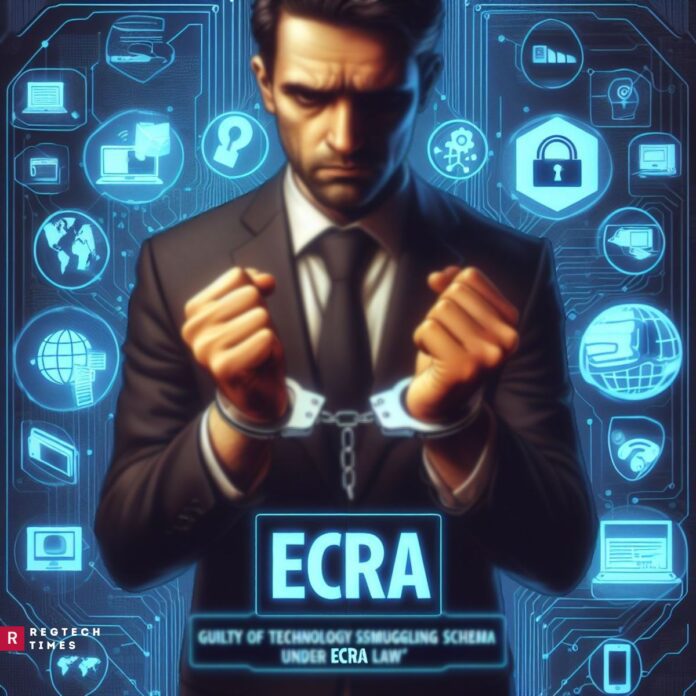Recently, two Russians acknowledged their involvement in a plot to acquire and illegally export regulated aviation technology to Russian end customers. One of the defendants, Oleg Sergeyevich Patsulya, also admitted to taking part in a plot involving global money laundering. This case explores the complexities of the illicit activity and looks at its wider ramifications under ECRA.
What is ECRA?
The goal of the Export Control Reform Act (ECRA) is to make U.S. export control laws more robust and up to date. ECRA strengthens the government’s capacity to regulate the transfer of sensitive technologies, products, and services to overseas organizations—especially those that could endanger national security. The goal of ECRA is to strike a balance between promoting lawful trade and preventing vital technologies from ending up in the hands of enemies. It offers the legal foundation for controlling exports, guaranteeing adherence to global commitments, and preserving American technological leadership.
The Unlawful Scheme:
Oleg Sergeyevich Patsulya and Vasilii Sergeyevich Besedinx planned an illegal scheme in which they purposefully avoided complying with U.S. export laws and regulations in order to further their own interests. Operating out of Miami-Dade County, Florida, they planned to take advantage of the system’s weaknesses, which were made more apparent following Russia’s assault against Ukraine and the ensuing escalation of U.S. sanctions. Their plan, which was started in May 2022, focused on obtaining and transferring regulated aviation technology illegally to Russian consumers. Patsulya and Besedinx knowingly engaged in conduct that jeopardized national security by soliciting orders from Russian buyers and then acquiring the necessary aircraft parts from U.S. vendors, including one situated in Arizona. Their activities showed a flagrant disregard for the possible effects of their illicit trade on international relations and the security environment, in addition to breaking established laws like ECRA.
The Gravity of Their Actions:
The direct threat to national security posed by Patsulya and Besedinx’s acts makes them extremely serious. The act of smuggling critical aircraft technology into Russia posed a threat to both world stability and American interests. Their misbehavior is all the more alarming because they broke rules intended to protect us from these kinds of risks. The focus Attorney General Merrick B. Garland has placed on the Justice Department’s commitment to resolving these infractions is indicative of the possible geopolitical effects of their actions in addition to the legal ones. Such acts jeopardize attempts to uphold peace and security in a globalized society and erode confidence in international trade.
The Collaborative Effort:
The joint endeavor to demolish Patsulya and Besedinx’s illegal plan is a perfect example of how law enforcement and regulatory organizations may work together to counteract global threats. The fact that United States Attorney Gary Restaino acknowledged the existence of this cooperative strike group emphasizes the use of many agencies in the prosecution of those who violate sanctions. In order to successfully disrupt unlawful export operations, a coordinated effort involving the Department of Justice, Department of Commerce, and other pertinent agencies is being made.
In addition to making it easier to prosecute specific cases, the cooperative approach advances the more general objective of bolstering export control protocols and defending national security interests. It bears witness to the common determination of states to protect international standards and stop sensitive technologies from being transferred to unapproved parties by enforcing ECRA, therefore promoting stability and security on a worldwide scale.
The Details of the Scheme:
Patsulya and Besedin were able to obtain orders for different aircraft parts and components from Russian buyers, mostly commercial aviation firms, between May 20, 22 and May 11, 2023. They then obtained these goods from American vendors, one of whom was situated in Arizona, and secretly transported them to Russia. The defendants were aware that they were dealing with restricted goods that needed an export authorization from the Department of Commerce.
The Broader Implications:
This ECRA related case emphasizes how important it is to maintain a careful balance between protecting national security and allowing lawful trade, as well as how important it is to monitor and enforce export controls. Matthew S. Axelrod, assistant secretary for export enforcement, underlined the commitment to vigorous enforcement against violators of Russia controls, particularly those who try to use false customer names to conceal Russia as the true destination for their commodities.
In conclusion, these Russian nationals’ guilty pleas serve as a sobering reminder of the wide-ranging effects of illegal activity. Enforcing stringent export controls and protecting sensitive technologies are essential in today’s linked world when national security is at risk.



